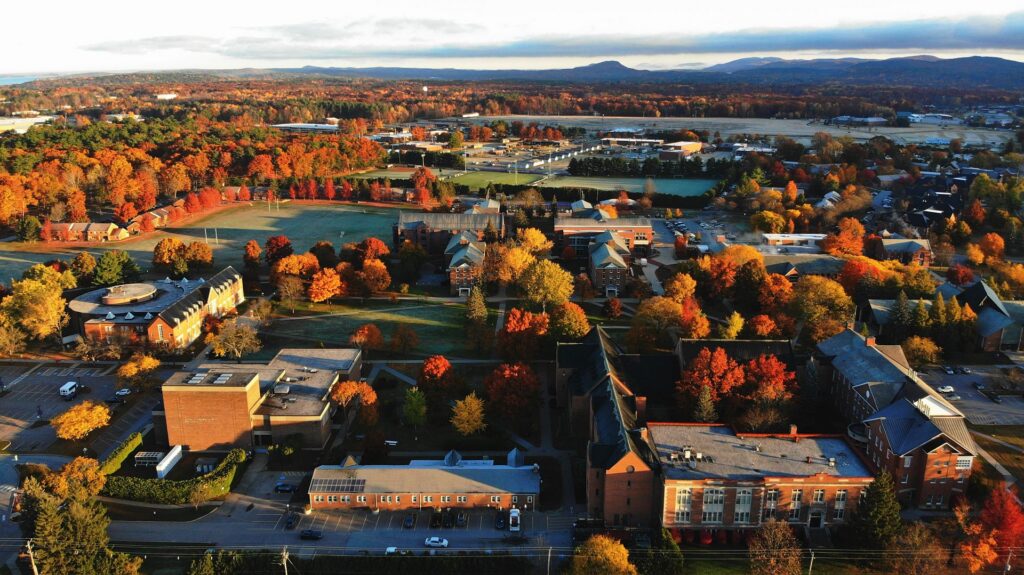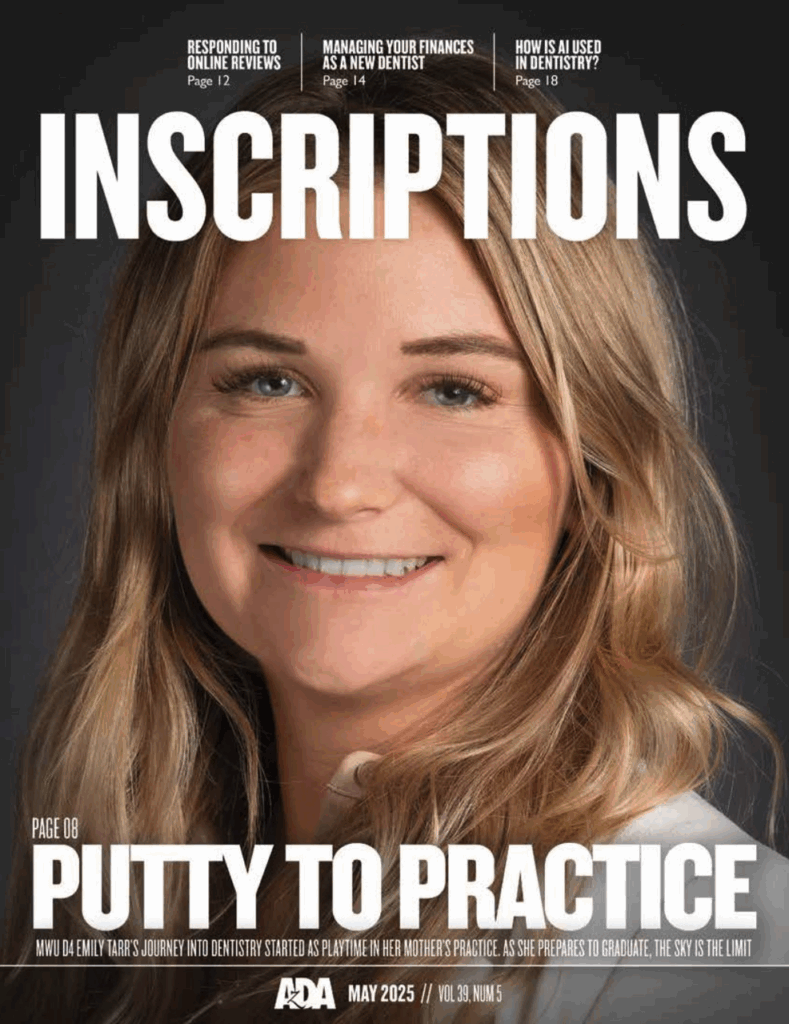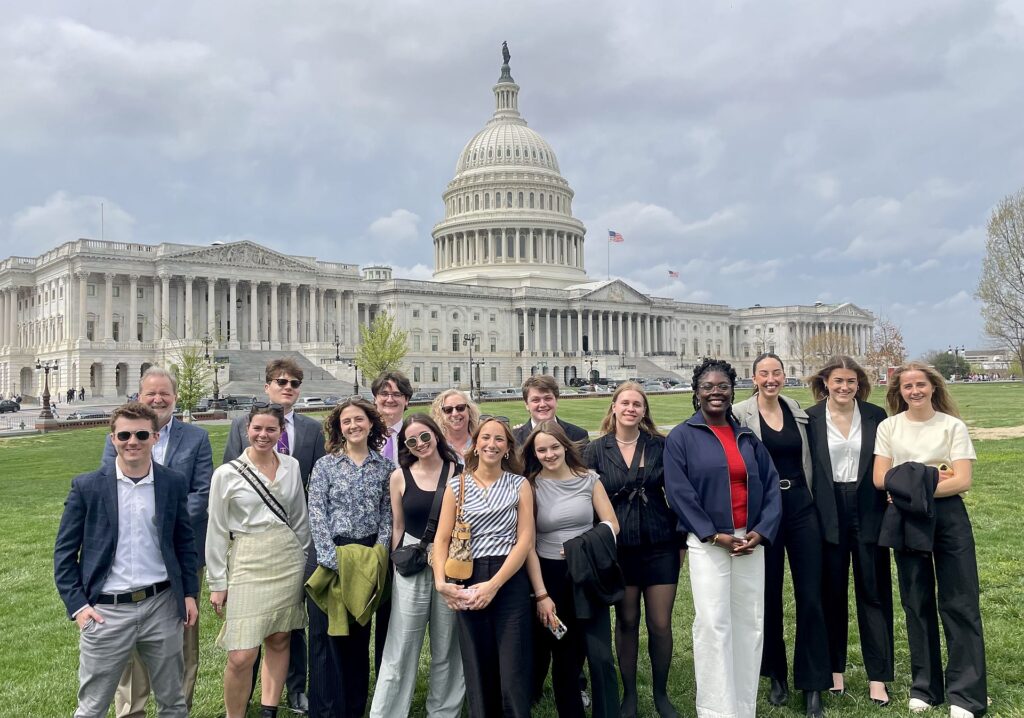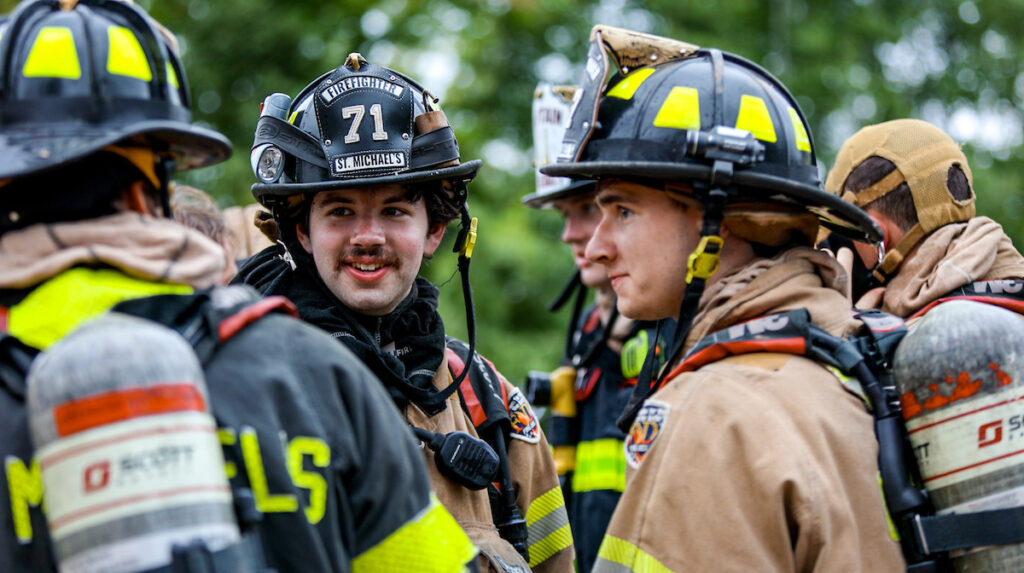Saint Michael’s has added another layer to its Junior Seminars this 2023-24 academic year by bringing together two powerhouses from Boucher Career Education Center and Purposeful Learning to give juniors a bigger dose of career-readiness.
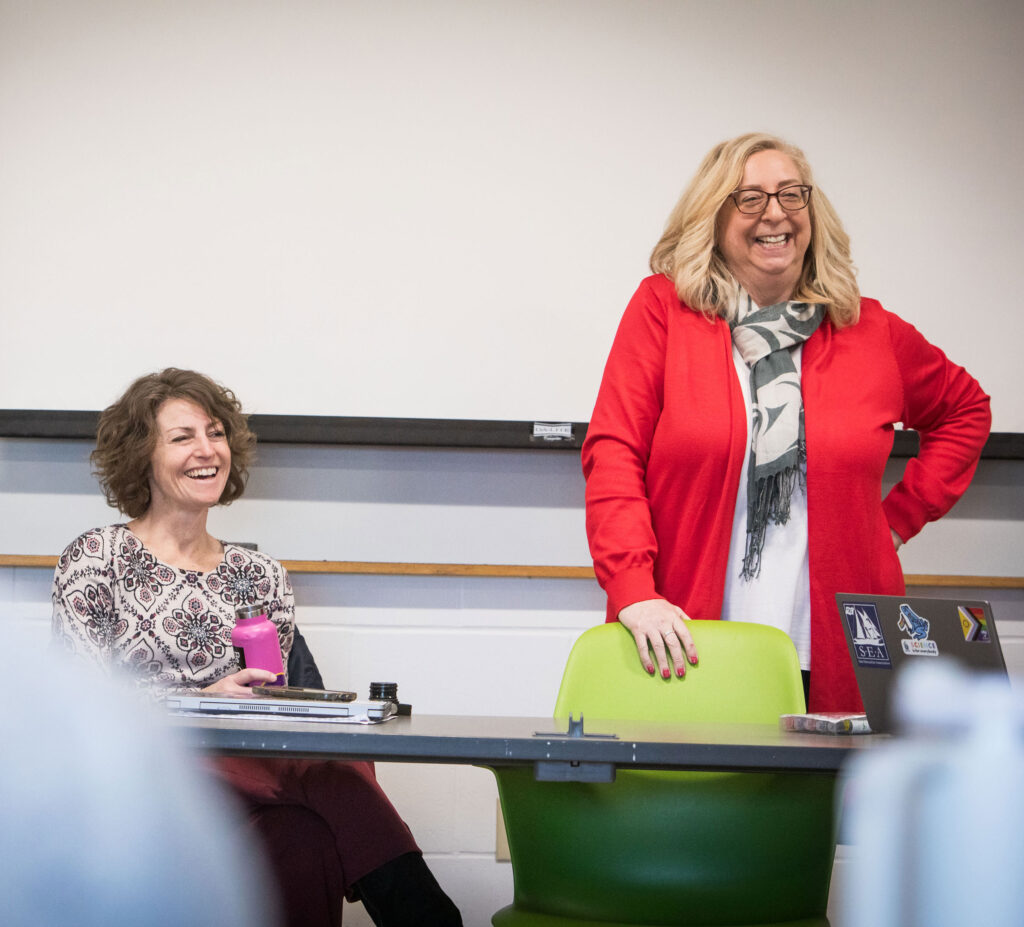
Ingrid Peterson (right) and Heidi St. Peter visit a Junior Seminar last month. (Photo by Cat Cutillo/Saint Michael’s College)
Ingrid Peterson, Director of the Boucher Career Education Center, and Heidi St. Peter, Director of Purposeful Learning, have combined forces and are piloting a one-week curriculum within every Junior Seminar this fall and spring. The duo visited each Junior Seminar classroom two or three times both semesters over a six-week stint. The additional curriculum builds off Saint Michael’s Ethical Leadership framework to combine insights from both Purposeful Learning and Career Education.
“Having a Junior Seminar that all students are required to take is relatively unique to St. Mike’s,” Peterson said. She explained that most colleges have some form of first-year and senior seminars but “not many offer a required Junior Seminar and it’s a bonus for our students to have a career component as part of the course.”
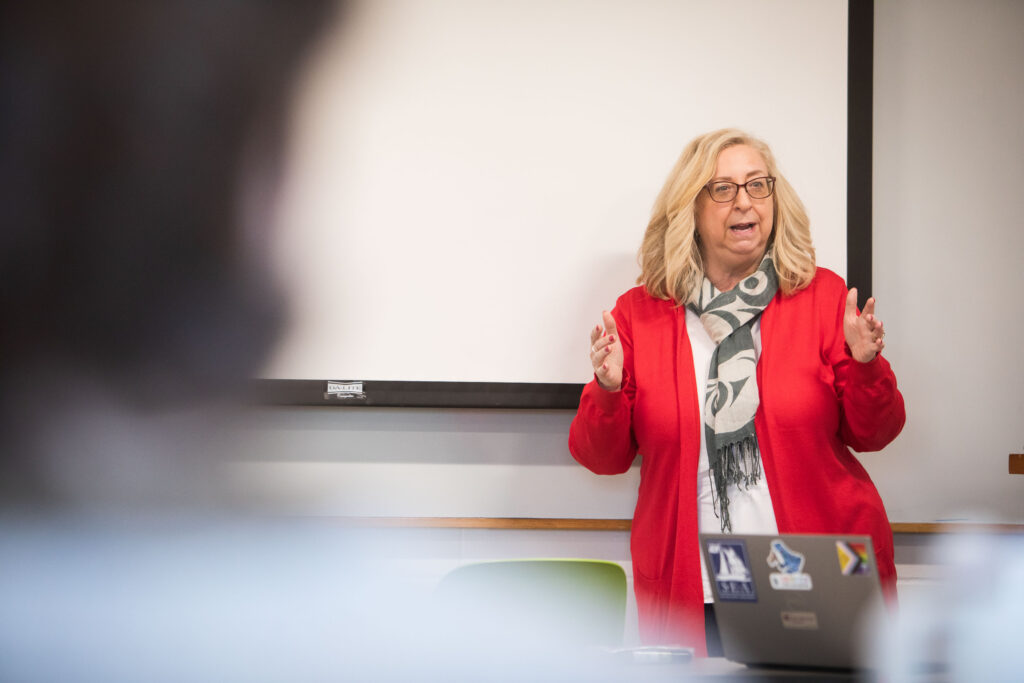
Ingrid Peterson (Photo by Cat Cutillo/Saint Michael’s College)
The Junior Seminar requirement was added to the core curriculum in 2017 at Saint Michael’s. Katherine Kirby heads the Junior Seminar program at Saint Michael’s and is the Associate Professor of Philosophy & Ethics and Co-Director of Equity Studies. Kirby said while some other colleges do offer Junior Seminars for students, Saint Michael’s is unique and is designed to “engage students in interdisciplinary critical reading, thinking, writing, discussion, and research on issues that impact human and/or planetary well-being.”
Kirby explained that students are well into their majors by the time they experience the Junior Seminar, and this gives Saint Michael’s students the opportunity to explore classes they wouldn’t otherwise have taken. Students are encouraged to take Seminars outside of their typical studies and majors – an echo of Saint Michael’s liberal arts foundation.
“Junior Seminar is designed to catch students at a very particular moment in their college career,” Kirby said. She noted many are taking on leadership roles by their junior year and this gives them the chance to converse about “what kinds of leaders they are and wish to be.”
Kirby said Peterson and St. Peter have added a deeper level of reflection on leadership to the Junior Seminars this academic year and Kirby has noticed a new confidence emerging from the students.
“Ingrid and Heidi have a beautiful way of helping students think about current steps that will support their aspirations for the future,” Kirby said.
Peterson works with the students to help them identify the essential skills that employers are looking for while St. Peter applies the Ethical Leadership framework, which is rooted in a unifying theory to help students recognize when to lead and how to lead.
“Junior Seminar is the perfect time for a pause to consider what you’ve learned, what skills you’ve gained, what else you want to learn, and how you can best prepare for your inevitable departure from Saint Michael’s,” St. Peter said.
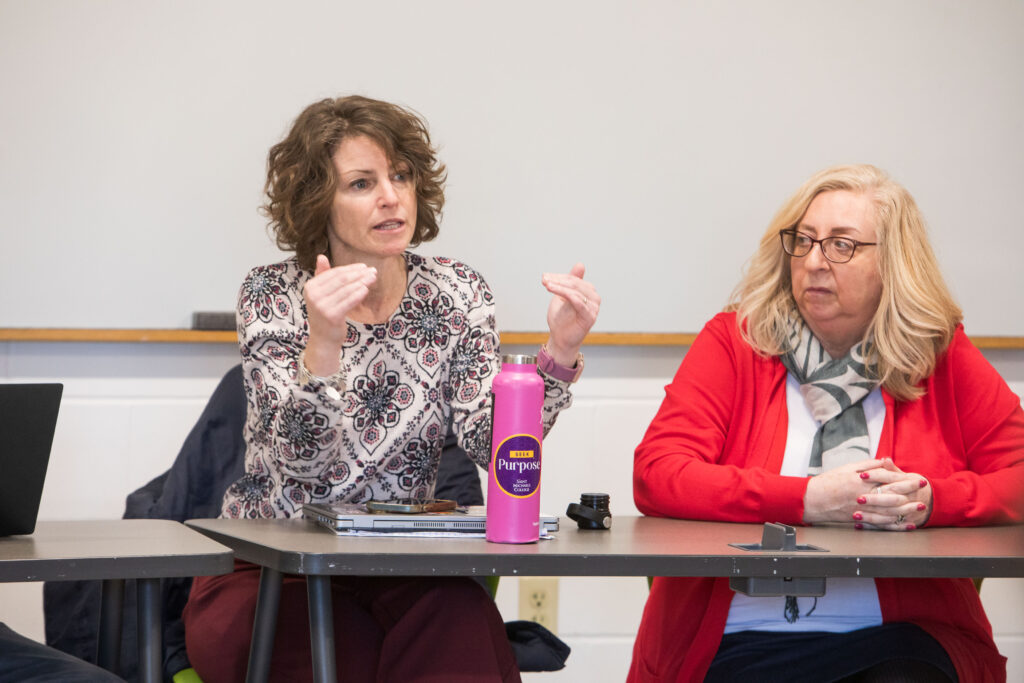
Heidi St. Peter (Photo by Cat Cutillo/Saint Michael’s College)
Peterson and St. Peter worked with Kirby to develop the curriculum. The trio wanted to create something that would help students define the skills they were gaining at Saint Michael’s.
“The fact that we are able to have this touchpoint with every single junior on campus is an amazing opportunity for our students to pause in their academic work and think about how to put their competencies together to move forward from St. Mike’s as a good human and someone employers seek out,” Peterson said.
During a visit last month to Biology Professor Declan McCabe’s Junior Seminar class, St. Peter talked about the Ethical Leadership Framework and helped students identify how they achieved “skills that come from being part of our community.” St. Peter outlined the key components that Saint Michael’s had identified as being the core values for leading oneself within the Ethical Leadership Framework, which are self-awareness and development, integrity, critical thinking and reflective practice, and professionalism. She also outlined the core values for leading others, which are equity and inclusion, teamwork, and communication skills and conflict resolution.
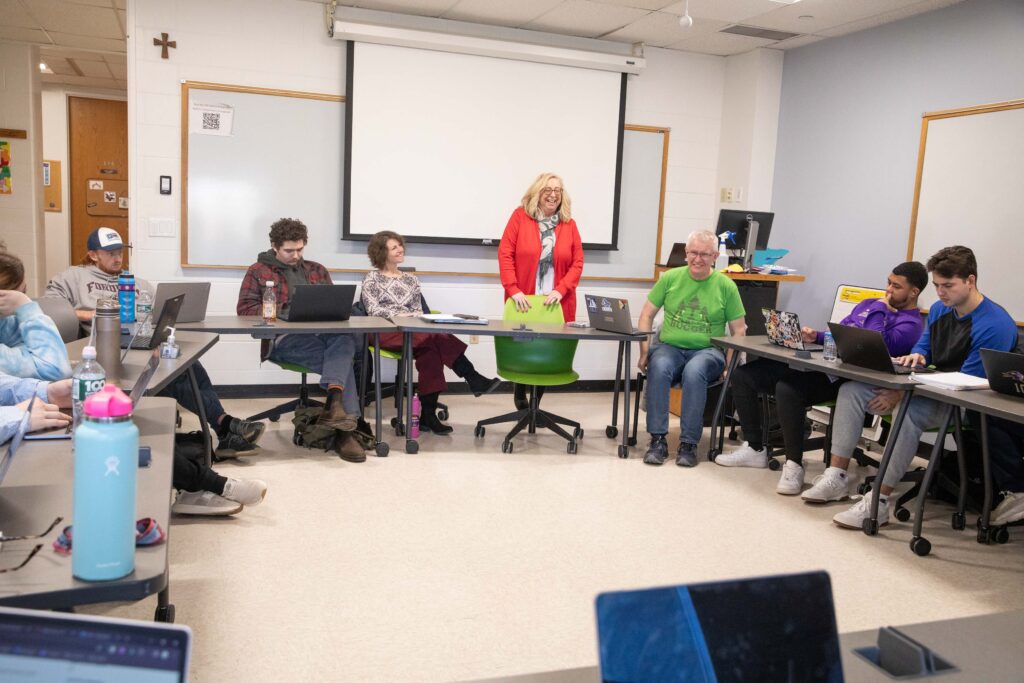
Ingrid Peterson (right) and Heidi St. Peter visit a Junior Seminar last month. (Photo by Cat Cutillo/Saint Michael’s College)
St. Peter asked students to brainstorm where they have gained these skills both in and outside of the classroom, and acknowledging leadership as a practice, where and how they could continue to practice and grow these skills.
Next, Peterson helped prepare students for entering the workforce or graduate school. She asked them to identify a list of competencies they already possess that will help them succeed in their next steps, as well as the skills that they still need to improve upon. Peterson referenced the National Association of Colleges and Employers (NACE) standards. She put the assignment into a real-world context by asking them to find a real job posting that they would like to apply for and use that job to recognize what skills they already had to land that job as well as what skills they still needed to acquire.
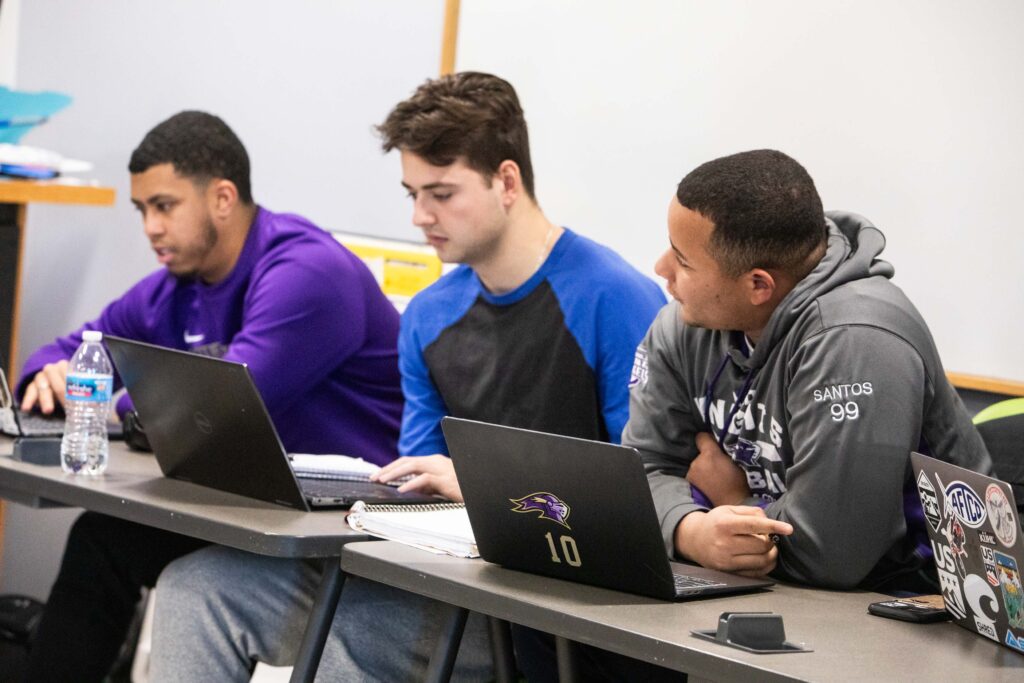
Students in Professor Declan McCabe’s Junior Seminar class last month. (Photo by Cat Cutillo/Saint Michael’s College)
“Essentially, I want them to do some goal-setting, so they’ll be prepared to take the deep academic work they have done in their disciplines and pair it with practical skills that employers want them to have,” Peterson said.
Peterson said the visits have also prompted more students to set up meetings with staff in Boucher Career Education Center to talk about more about their futures outside of the Junior Seminar presentations.
Peterson said, “This seed planting is exactly what we’re trying to do!”

For all press inquiries contact Elizabeth Murray, Associate Director of Communications at Saint Michael's College.

